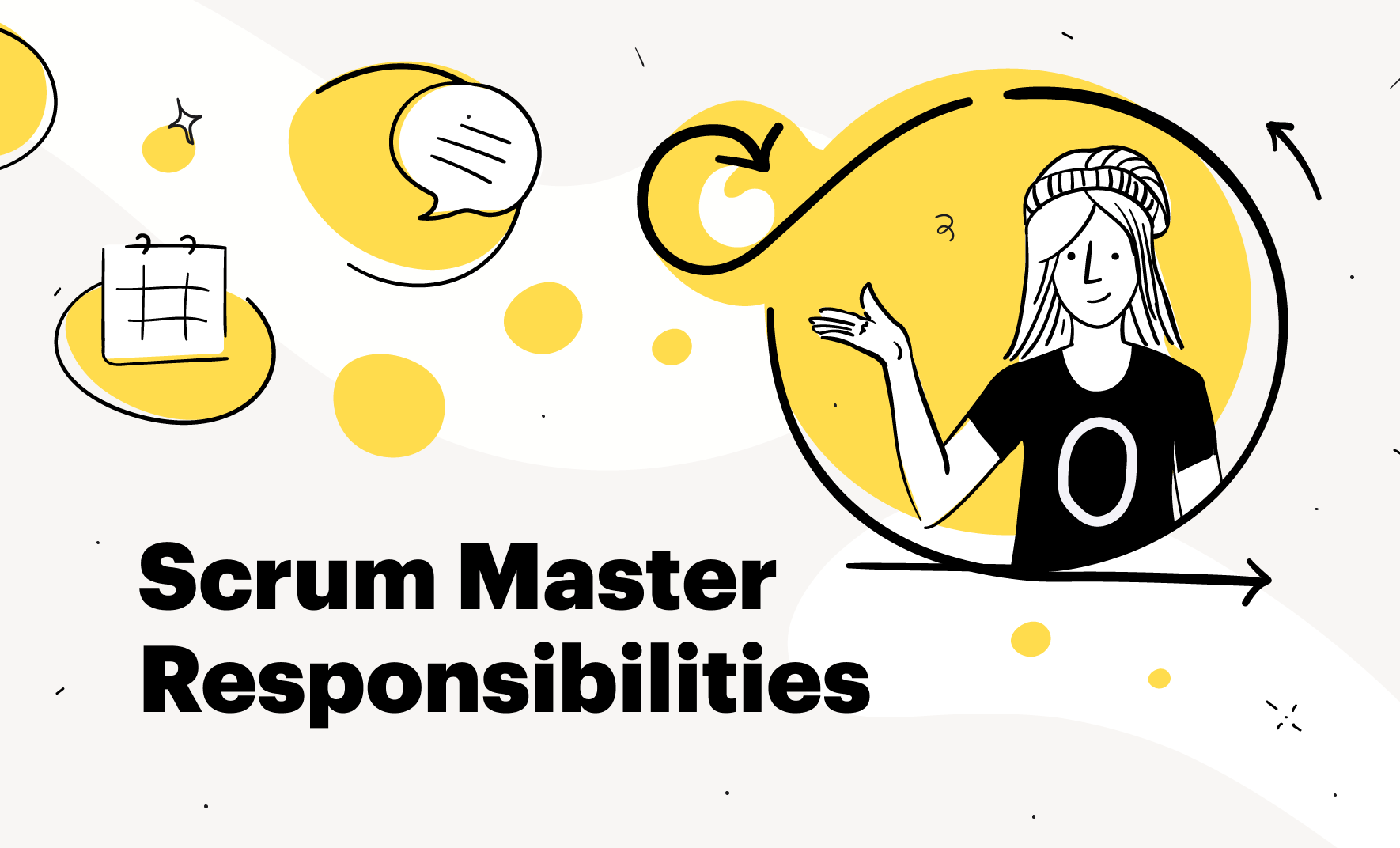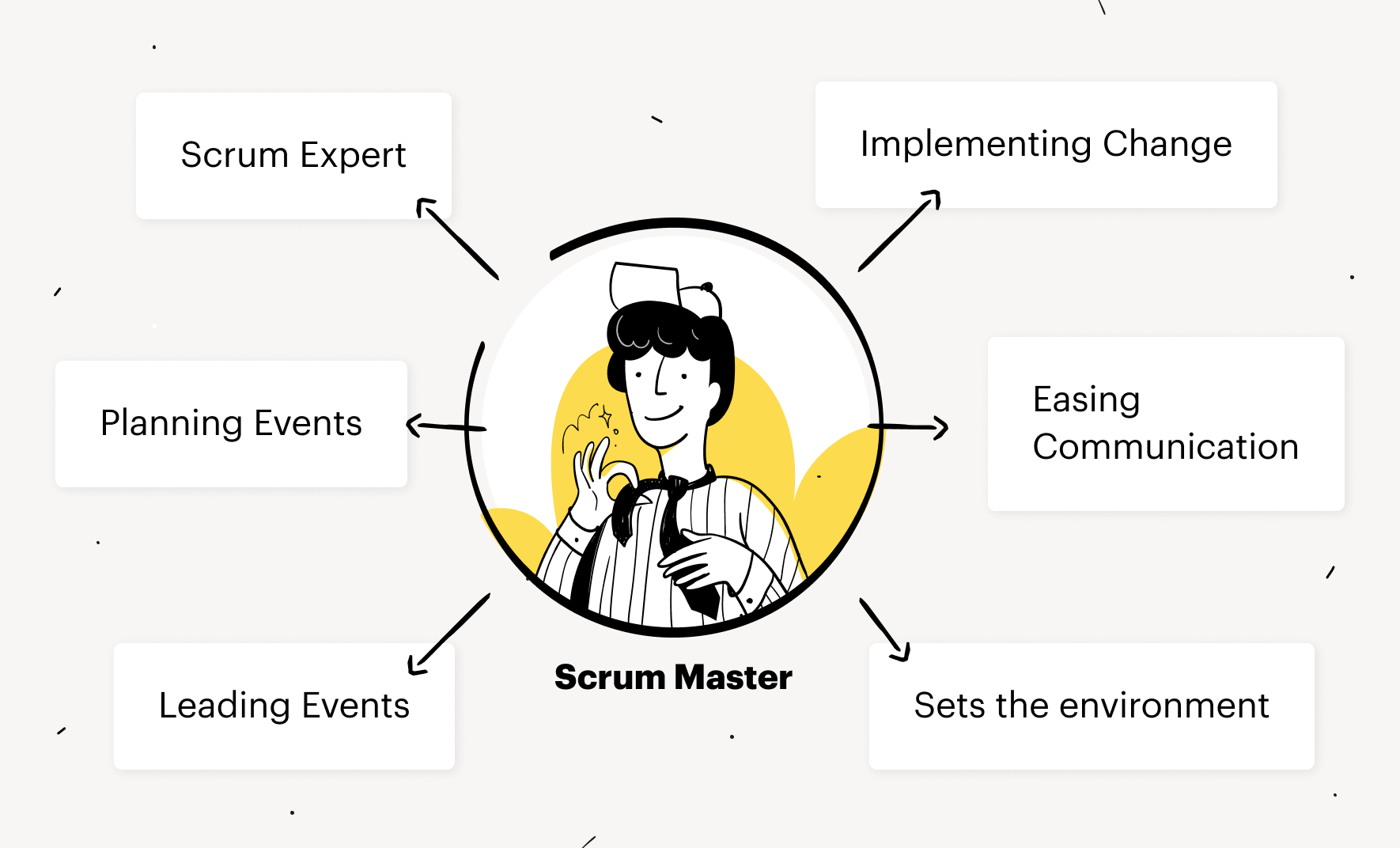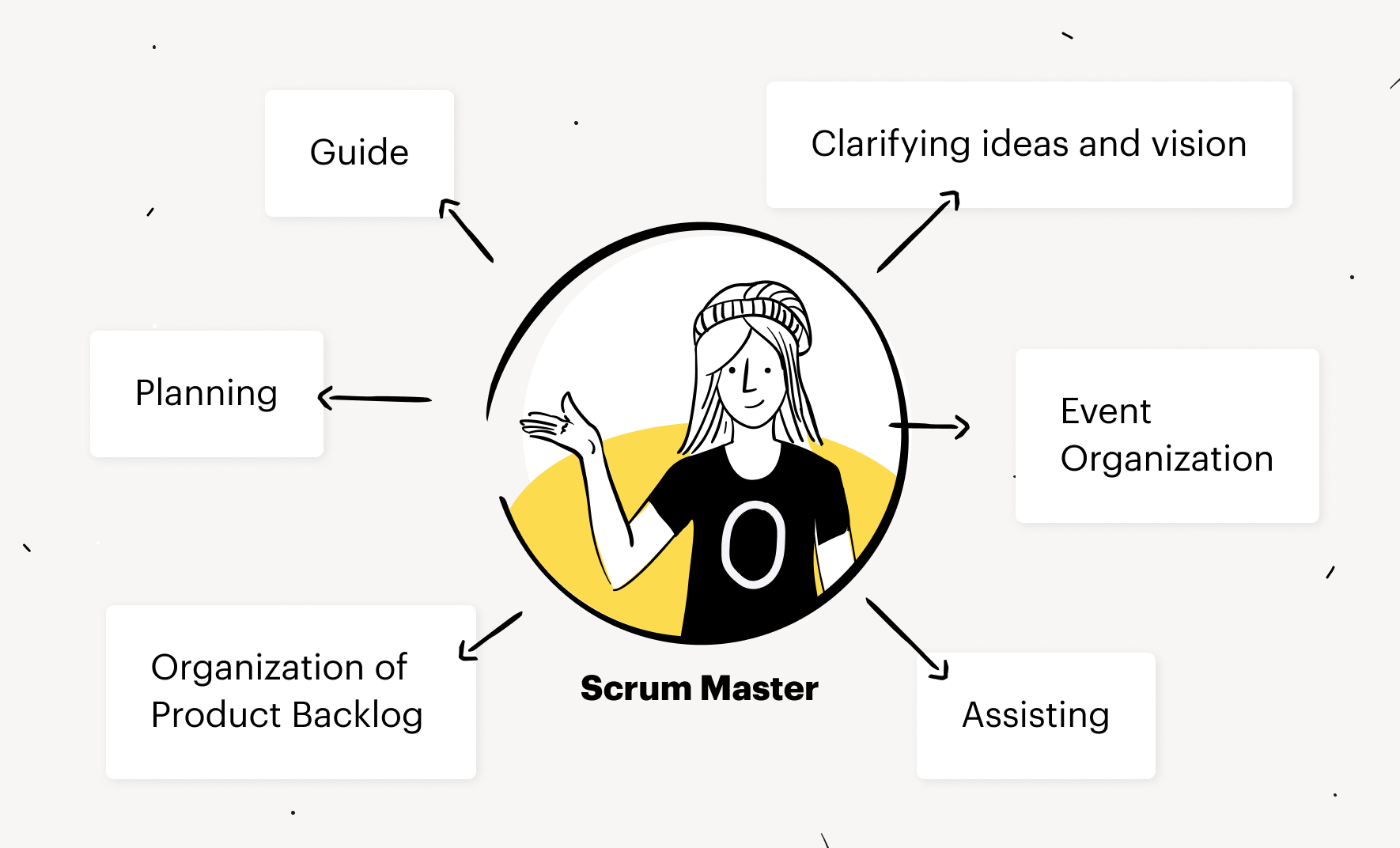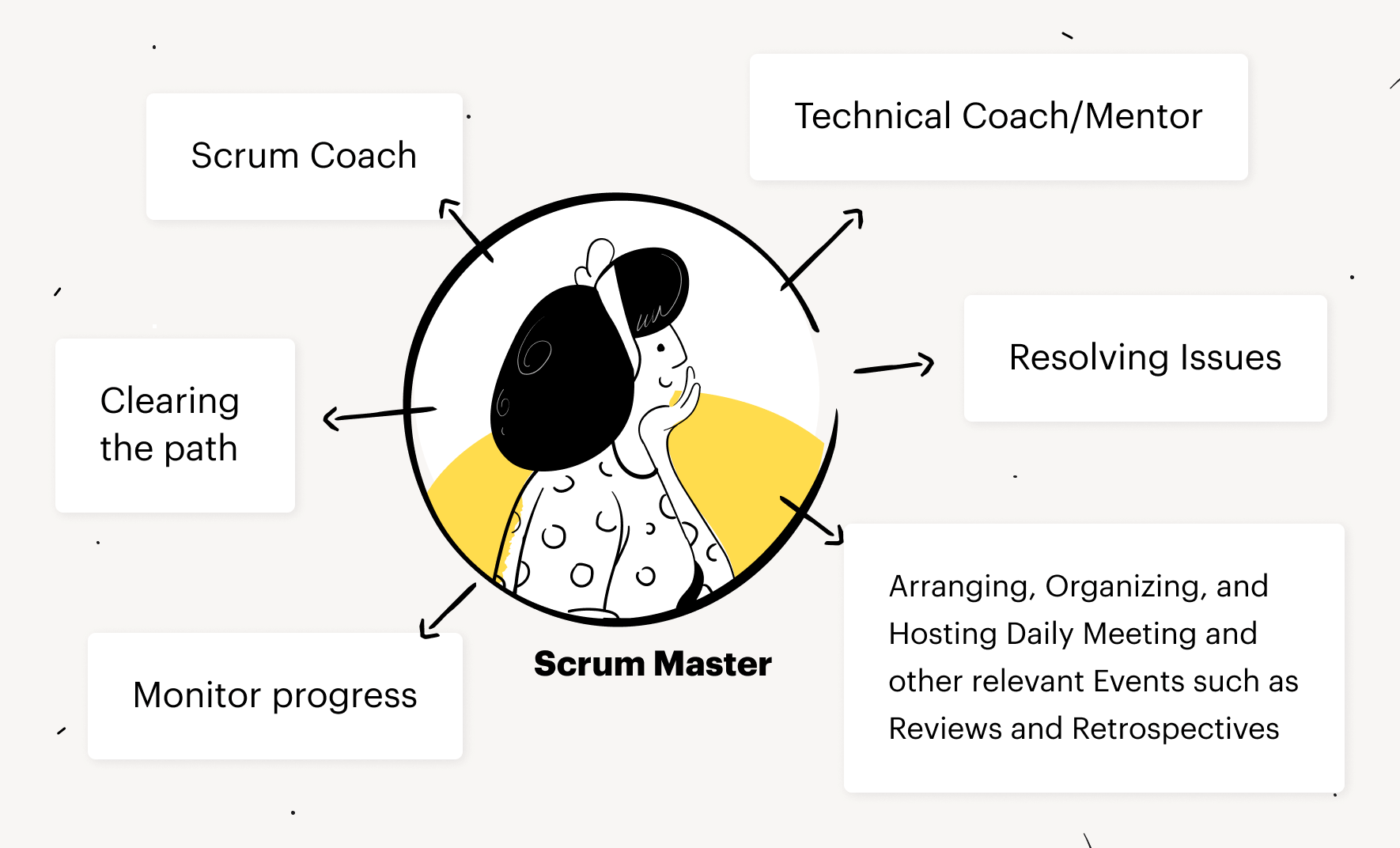What are the Scrum Master Responsibilities?

Scrum is a widely-used project management system based on the Agile method. There are 3 roles in the Scrum project management system – Scrum master, Product owner, and Development team. In this article, we will explain everything about the role of the Scrum Master and its importance.
1. What is the Scrum Master?
Obviously, in every Scrum system, there are key roles for the various parties. A Scrum Master, alongside the Product Owner and the Development Team, are the terms for these specific roles as defined by Scrum. The Scrum Master is a vital element in this system. Firstly, they provide a link and a pathway of communication and collaboration between the ideas, vision, and business strategy of the Product Owner and the actual production of work and completion of tasks by the Development team.
2. Skills That Scrum Master Needs
It is clear that Scrum’s ideas, values, and philosophy are very much based on the idea of teamwork. Mutual sharing of information, collaboration, and agreement on set stages of action are vital. Practically, the Scrum Master’s role is to resolve any issues and clear any obstacles that are blocking this flow. Although, this involves a host of skills and talents, from technical advice and input to human resource concerns. Essentially the Scrum Master sets up the environment that allows the Scrum to function.
This role is important in marrying the different focuses of the team. As such talented, experienced Scrum Masters are undoubtedly worth their weight in gold. Here are the skills that every successful Scrum Master needs:
- Problem-solving skills
- Adaptability
- Motivational skills
- Communication skills
- Organization skills
3. What are the Scrum Master’s Responsibilities?
The Scrum Master holds a very general position in the team, often working in the background, nevertheless, they do have clear responsibilities.
3.1. Scrum Master Responsibilities to the Scrum

- Scrum Expert – Being the chief organizer and leader of the actual Scrum, The Scrum Master needs to know their stuff. As a result of their expertise, they are able to help the team understand the organizational aspects and events on which Scrum is based and instruct on the underlying principles and values involved. This includes instructing team members who are new to the system and integrating individuals into the team.
- Planning Events – The Scrum Master is responsible for planning the various meetings through which Scrum Sprints are developed.
- Leading Events – The Scrum Master is responsible for how the events and meetings function in practice. Who speaks, when, where, and for how long – a kind of referee/host.
- Implementing Change – If necessary, it is the Scrum master’s responsibility to take the feedback and comments from the team and use these to put in place future improvements.
- Easing Communication – One of a Scrum Master’s responsibilities is the facilitation of communication both within the team and through the Product Owner to the external interested parties. It is not the Scrum Master’s responsibility to have direct dealings with these external stakeholders. However, the Scrum Master needs to make clear to the Product Owner any issues or potential problems that need resolving.
- Sets the environment – Within a Scrum is crucial for the success of the project for all the team to be working together, supportive, and collaborative. The Scrum Master is responsible for setting the environment in which all the team members can flourish, feel confident enough to speak out and ask for help, and feel valued as an individual within the group.
3.2. Scrum Master Responsibilities to the Product Owner

Scrum Masters have a role that involves a huge amount of liaison with the Product Owner, not only as a conduit for communication between the Product Owner and the Developenmmet team but also as direct technical input and advice for the Product Owner.
- Guide – Firstly, if necessary, guide the Product Owner through the Scrum processes and ideas.
- Planning – Input into the Product Owner’s planning strategy for the Product backlog and breakdown of key elements of the product.
- Organization of Product Backlog – Alongside the Product Owner, helping arrange the Product Backlog into a logical and practical sequence. Suggestions on technical factors and functions.
- Clarifying ideas and vision – Questioning and aiding the Product Owner’s ideas and vision. This will give a full understanding of the need to achieve successful results. This will help the Product Owner reflect and get an overview that can be clearly passed on to the team.
- Event Organization – Organizing Scrum events as requested by the Product Owner and finalizing the arrangements and attendance.
- Assisting – Assisting the Product Owner when needed in clarifying goals, and explanations to the Development Team.
3.3. Scrum Master Responsibilities to the Development Team

The Scrum Master can be seen as the team head, but not in terms of authority. For example, the Scrum Master for the development team is a kind father figure crossed with a coach. His role is to allow the team to concentrate on their specified tasks. For example, giving them the resources and freedom is important as is the resolution of any issues and removal of blocks or hurdles.
- Technical Coach/Mentor – Scrum Masters should have enough technical ability and know-how to offer valuable advice on technical matters to the team.
- Scrum Coach – The Scrum Master should be the physical embodiment of the Scrum Values and Principles and lead by example. This involves giving the team the opportunity and freedom to self-organize and collaborate as they see fit. It is also the Scrum master’s responsibility to ensure that the Development Team is aware of the Scrum Values and that the whole team adopts the system.
- Clearing the path – A good Scrum Master will make sure that the Development team can concrete and focus on the tasks they have without impediment. Consequently, this means that the Scrum Master is responsible for organizing and requesting resources but also guiding the communication and funneling of information.
- Resolving Issues – It is the Scrum Master’s responsibility to resolve any issues that can come up within the Development Team. This could be regarding arguments and disagreements, differences of opinion or even absences for illness or vacations, for example.
- Arranging, Organizing, and Hosting Daily Meetings and other relevant Events such as Reviews and Retrospectives – The Scrum Master’s responsibility is to not only arrange the meetings that are so essential to Scrum but also to manage the meetings. This could mean giving time for everyone to speak, encouraging honesty, coaxing ideas, setting the atmosphere for group development and understanding, etc.
- Monitor progress – while the Scrum Master is not the Project boss they still need to monitor progress. As part of this, they should ensure that the team is on track to meet agreed deadlines.
To Conclude
A Scrum Master must wear many hats and straddle the line between having authority without wielding the true power of the Product Owner. By drawing on people skills but still having a technical and business mindset, being part of the development team but being apart from it. Whilst it doesn’t sound like much fun, a good Scrum Master is appreciated and a true asset to all involved in the project. Oiling the wheels and driving forward, all the Scrum team knows the value of a good Scrum Master and if you’ve done your job well all the Scrum Team realize that everybody in the team is only as good as those around them.